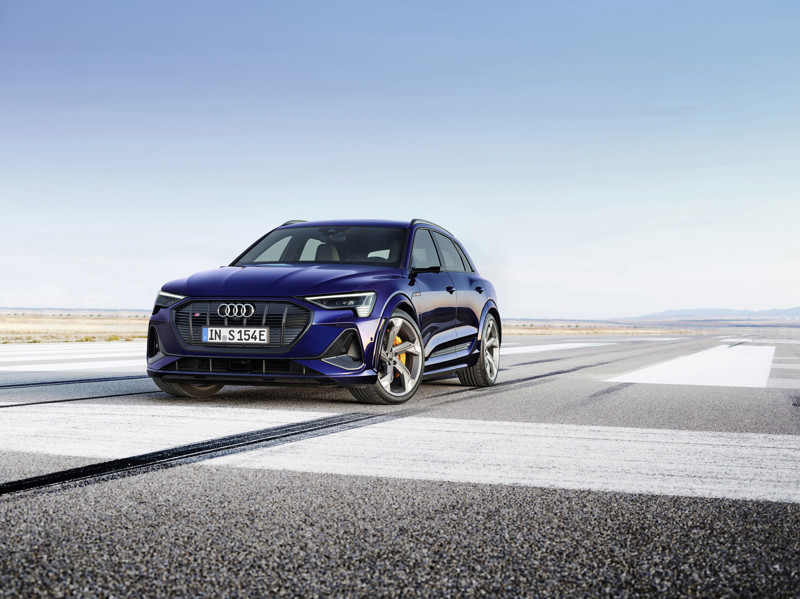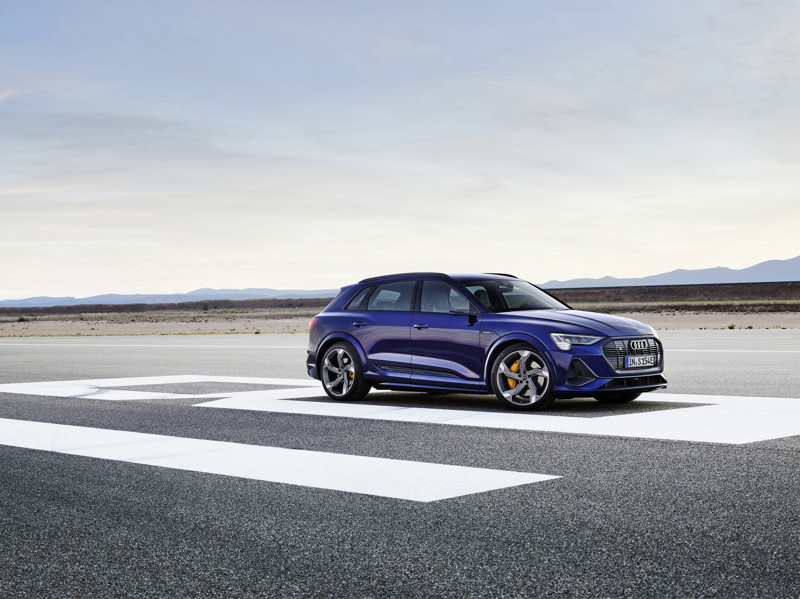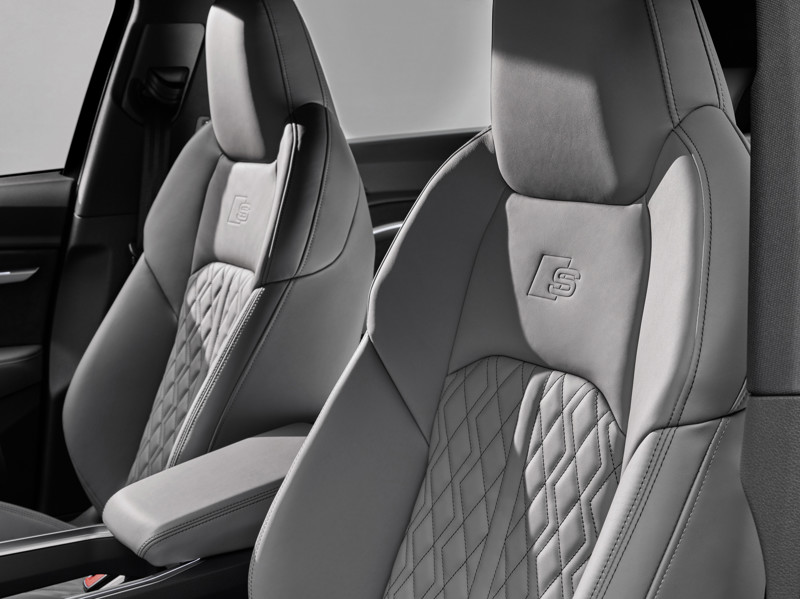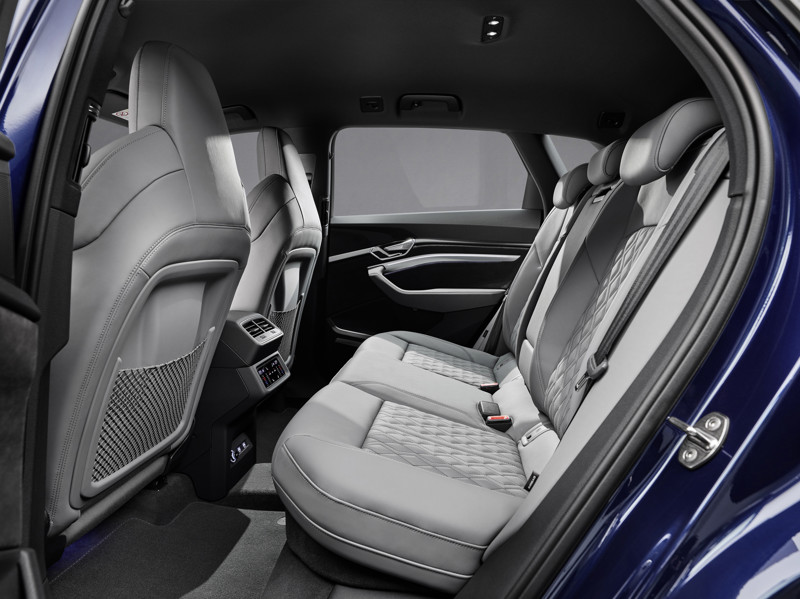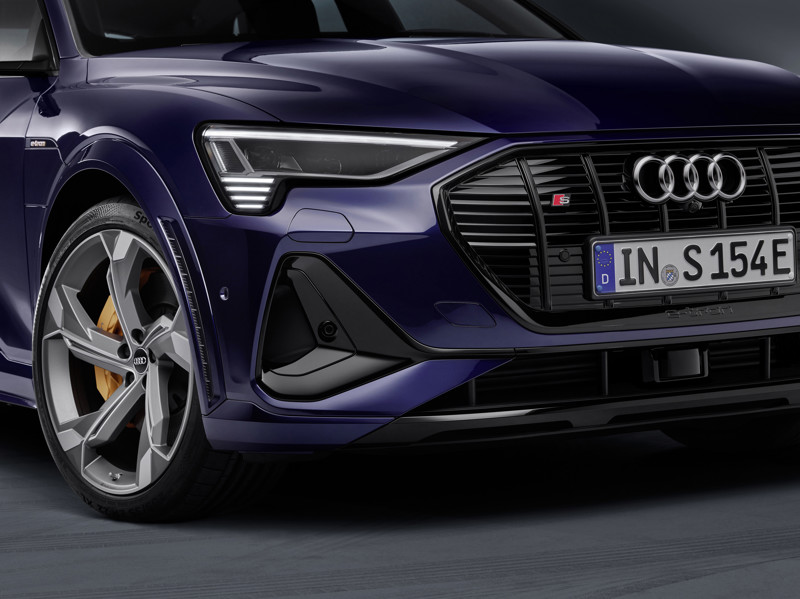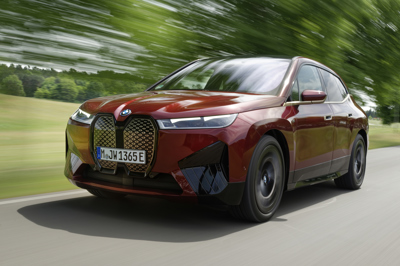Audi e-tron S
Audi e-tron S is an all-electric luxury SUV offering a WLTP range of up to 374 km (232 miles). EVKX.net has all the details you need.
Audi e-tron S
We've organized this article into specific sections for easier navigation. Click the links below to jump to different areas or read on for the full article. Additionally, we offer an overview of the full specifications, an image gallery, detailed information about charging performance, and some online reviews. Our sections include:
- Performance
- Battery, Range, and Charging
- Drivetrain (suspension, brakes, and steering)
- Exterior (paint colors, wheels, and more)
- Interior (seating and features)
- User interface and controls
- Infotainment system
- Lighting Systems
- Advanced Driver Assistance Systems (ADAS)
- Cargo Space and Towing
Performance
With overboost, the Audi e-tron S reaches a maximum power of 370 kW (503 hp / 496 bhp). Without overboost, it delivers 320 kW (435 hp / 429 bhp). The maximum torque is 973 Nm (718 lb-ft). It accelerates from 0 to 100 km/h (0 to 62 mph) in 4.5 seconds and reaches a top speed of 200 km/h (124 mph), demonstrating its solid performance.
Battery, Range, and Charging
The high-capacity battery has a gross capacity of 95.0 kWh and a net usable capacity of 86.0 kWh, providing a 9.0 kWh buffer (9.5%) for battery protection. With a nominal voltage of 396 volts, the system is classified as a 400-volt battery system, aligning with industry standards.
This Lithium-Ion battery utilizes NMC (Nickel Manganese Cobalt) technology.
Under the WLTP (Worldwide Harmonized Light Vehicles Test Procedure) standard, the vehicle's range varies between 374 to 344 km (232-214 miles), depending on the specific configuration and options, such as wheel size. Larger wheels can increase energy consumption and subsequently reduce the overall range. The vehicle's energy consumption is rated at 23.0 kWh/100 km for the base model and 25.0 kWh/100 km for the top-tier model under the WLTP test cycle.According to the WLTP (Worldwide Harmonized Light Vehicles Test Procedure) standard, the vehicle's range is 374 km (232 miles), with an energy consumption rate of 23.0 kWh/100 km (3 mi/kWh). For more details about the range, see real-world data and range listings on this model’s range and consumption page.
The vehicle supports fast DC charging with a maximum power of 150 kW. Charging from 0% to 100% takes approximately 45 minutes, while a typical 10% to 80% charge takes about 27 minutes with an average charging speed of 136 kW. Considering an additional 5 minutes for each charging stop due to driving interruptions, the optimal charging range is from 3% to 81%. This results in an effective charging speed, including time lost, of 115 kW, with each charging session taking about 35 minutes and 51 seconds.
In a 1000 km challenge at a constant speed of 120 km/h (75 mph) with an assumed consumption rate of 25.5 kWh/100 km, the trip would take about 9 hours and 49 minutes, needing three charging stops from 14% to 80%, totaling 90 minutes of charging time.
Onboard Charger
An optional 11 kW onboard charger reduces the full charge time to approximately 7 hours and 49 minutes.
Charge Port
The location of the charge port is on the left front side. This location makes it easy to charge stations where you park side into the charger.
Connector types vary by market: this model uses CCS Combo 1 in North America and CCS Combo 2 in Europe. For complete specifications for all markets, refer to the full specifications.
A second port is on the right front side. This extra port gives you more parking options for AC charging.
The connector types vary between different markets. This model uses J1772 for North America and TYPE2 for Europe. For complete specifications for all markets, refer to the full specifications.
Drivetrain
The Audi e-tron S has an all-wheel drive system supported by three motors. One on front axle, and two on rear axle.
The motors used are Induction Motors.
Suspension
The front suspension is double wishbone, and the rear suspension is Multilink. It uses air suspension and hydraulic dampers.
The suspension is fully adaptive on the front and rear axle, so height and damping can be adjusted manually and automatically.
The minimum ground clearance is 152 mm, and the maximum is 248 mm.
Steering
Progressive steering is standard on the Audi e-tron S, automatically adjusting the steering ratio based on speed for improved control and comfort.
Drive Modes
The Audi e-tron S lets the user select different drive modes that affect the car's handling.
The driver can choose between 7 modes:
- Dynamic: Dynamic steering, low ride height, and dynamic throttle and suspension damping.
- Efficiency: Balanced steering, low ride height, and balanced suspension damping.
- Comfort: Balanced steering, normal ride height, balanced throttle, and comfort-oriented suspension damping.
- Allroad: Balanced steering, high suspension height with balanced throttle and comfort suspension damping.
- Offroad: Balanced steering, max suspension height, and balanced suspension damping.
- Auto: Balanced steering, adaptive suspension height and damping, and balanced throttle.
- Custom: Custom steering, suspension damping, and throttle.
Brakes
The Audi e-tron S is equipped with cast-iron disc brakes on both the front and rear.
The front discs measure 400 mm, while the rear discs are 350 mm.
Regenerative Braking
The regenerative braking system in this model offers several modes to enhance efficiency and driving experience. The most efficient option is the Automatic Regeneration Mode, where the vehicle coasts when possible and employs regenerative braking to reduce speed as needed.
Manual regeneration is another mode, where regenerative braking is controlled by pressing the brake pedal. The brake system blends in physical brakes only when necessary.
Another option is the Regen on Accelerator Pedal mode where regenerative braking is activated when the driver eases off the accelerator pedal. This system allows the vehicle to slow down and recover energy without the driver needing to press the brake pedal, a feature often referred to as one-pedal driving.
However, it is not considered full one-pedal driving since, at low speeds, the vehicle will keep rolling until it comes to a stop by itself.
Drivers can also adjust the regenerative braking strength when lifting off the accelerator. There are three levels of regenerative braking to choose from, allowing you to customize the driving experience to your preference.
The maximum regenerative power is 275 kW.
Exterior
The Audi e-tron S, with dimensions of 4901 mm in length, 1935 mm in width, and 1629 mm in height, falls into the Mid-size SUVs offer a blend of space, comfort, performance, and versatility, making them suitable for a wide range of drivers with diverse needs.
Audi e-tron S is available in a total of 61 paint colors, including solid, metallic, and pearlescent options. In addition to the standard palette, some colors are from the exclusive 'Audi exclusive' palette.
The Audi e-tron S offers multiple wheel options in different sizes, allowing you to customize your vehicle to suit your style and driving preferences. The available tire and wheel combinations include:
- 285/45 tires on 20" rims
- 285/40 tires on 21" rims
- en exterior.wheeloptions.square_large_wide_lowprofile
Narrower wheels improve consumption and provide a longer range, while wider wheels offer better traction and handling.
The car has four regular doors and a hatchback-style liftgate.
Soft close is common.optionalfeature function for the side doors.
There are two different roof options to select from.
The standard is just a regular roof.
As an option, you can order this model with a panoramic roof. The glass extends most of the roof, and occupants can open the front part. This glass makes the car’s interior feel more spacious and bright, which can improve the mood and comfort of the occupant. It has an electric curtain that occupants can use to protect against the sun.
Additionally, you can order the car with tinted windows from the B-pillar backward, which enhances privacy and reduces glare and heat from the sun, making the interior more comfortable for passengers.
As an option, double-glazed side windows are available to reduce cabin noise, enhancing the overall driving experience.
Audi e-tron S
Interior
The Audi e-tron S features a driver-centric interior that enhances the cockpit feel, surrounded by premium materials used in all key areas. It also includes a traditional center console that separates the driver and passenger, providing convenient storage and functionality.
Seats
The Audi e-tron S accommodates five passengers with two front seats and a three-seat bench in the rear.
First Row Seats
The front row offers five seat types to cater to various comfort and style preferences:
The following functionalities are available on the standard seat:
- Fore-and-aft adjustment (manually adjustable, electrically adjustable as an option)
- Recline adjustment (manually adjustable, electrically adjustable as an option)
- Height adjustment (manually adjustable, electrically adjustable as an option)
- Seat cushion angle adjustment (manually adjustable, electrically adjustable as an option)
- Height adjustable headrest
- Length adjustable headrest (optional)
- Heating (optional)
- ISOFIX (standard for passenger seat)
Available in:
- Gray fabric upholstering
- Brown leather upholstering
- Beige leather upholstering
- Black leather upholstering
The following functionalities are available on the sport seat:
- Fore-and-aft adjustment (manually adjustable, electrically adjustable as an option)
- Recline adjustment (manually adjustable, electrically adjustable as an option)
- Height adjustment (manually adjustable, electrically adjustable as an option)
- Seat cushion angle adjustment (manually adjustable, electrically adjustable as an option)
- Height adjustable headrest
- Length adjustable headrest (optional)
- Heating (optional)
- Adjustable lumbar support (electrically adjustable)
- Adjustable thigh support
- ISOFIX (standard for passenger seat)
Available in:
- Black leather upholstering
- Brown leather upholstering
- Black Dinamica/leather upholstering
The following functionalities are available on the s-line sport seat:
- Fore-and-aft adjustment (manually adjustable, electrically adjustable as an option)
- Recline adjustment (manually adjustable, electrically adjustable as an option)
- Height adjustment (manually adjustable, electrically adjustable as an option)
- Seat cushion angle adjustment (manually adjustable, electrically adjustable as an option)
- Height adjustable headrest
- Length adjustable headrest (optional)
- Heating (optional)
- Adjustable lumbar support (electrically adjustable)
- Adjustable thigh support
- ISOFIX (standard for passenger seat)
Available in:
- Black leather upholstering
- Brown leather upholstering
- Black Dinamica/leather upholstering
- Gray Dinamica/leather upholstering
The following functionalities are available on the s sport seat:
- Fore-and-aft adjustment (manually adjustable, electrically adjustable as an option)
- Recline adjustment (manually adjustable, electrically adjustable as an option)
- Height adjustment (manually adjustable, electrically adjustable as an option)
- Seat cushion angle adjustment (manually adjustable, electrically adjustable as an option)
- Heating (optional)
- Adjustable lumbar support (electrically adjustable)
- Adjustable thigh support
- ISOFIX (standard for passenger seat)
Available in:
- Black leather upholstering
- Brown leather upholstering
- Black Dinamica/leather upholstering
- Gray Dinamica/leather upholstering
The following functionalities are available on the multicontour seat:
- Fore-and-aft adjustment (electrically adjustable)
- Recline adjustment (electrically adjustable)
- Height adjustment (electrically adjustable)
- Seat cushion angle adjustment (electrically adjustable)
- Height adjustable headrest
- Length adjustable headrest
- Heating
- Memory
- Adjustable lumbar support (electrically adjustable)
- Backrest side bolsters adjustment
- Seat cushion side bolsters adjustment
- Adjustable thigh support
- Ventilation (optional)
- Massage (optional)
- ISOFIX (standard for passenger seat)
Available in:
- Black Dinamica/leather upholstering
- Brown leather upholstering
- Black Dinamica/leather upholstering
- Gray Dinamica/leather upholstering
Audi e-tron S
Second Row Seat
The second row features a standard three-seat bench with a 40:20:40 split, allowing each section to fold separately to increase cargo space.
Additional functionalities include:
- Height adjustable headrest
- ISOFIX (standard for outer seats)
Audi e-tron S
Interior Storage
The Audi e-tron S provides ample interior storage solutions to enhance convenience and organization:
- Cupholders: Two cupholders are located in the front center console, with an additional two in the rear armrest.
- Glove Compartment: A spacious glove compartment is situated in the dashboard in front of the passenger, ideal for storing essential items.
Interior Lighting
The Audi e-tron S offers a range of interior lighting options designed to create a pleasant ambiance and enhance visibility.
- Multicolor Ambient Lighting: This feature extends across the dashboard, door panels, and footwell, providing a harmonious and inviting atmosphere. You can customize the colors to suit your mood or preference, adding a personal touch to your driving experience.
Climate System
Two climate system options are available:
- 2-zone climate system: Supports different temperatures for the driver and passenger.
- 4-zone climate system: Supports different temperatures for the driver, passenger, and two separate passengers in the back seat
A standard heat pump is included, which can save significant energy that the EV would otherwise use for heating in cold weather.
Comfort Features
The Audi e-tron S includes several features to enhance comfort and convenience:
- Electrically Adjustable Steering Wheel
- Easy Entry Function: Moves the driver seat to facilitate easier entry into the car.
- Wireless Phone Charging
User Interface and Control
The control interface of the Audi e-tron S combines physical buttons, steering column stalks, and touchscreen displays to create a seamless and intuitive user experience.
Behind the steering wheel is a digital instrument cluster, and in the center console, there are two different infotainment screens.
Key screen details:
- Driver Information Display: A 12.3-inch screen integrated into the dashboard behind the steering wheel. It provides essential driving data such as speed, range, and navigation prompts.
- Center Console Touchscreen: A 10.1-inch touchscreen located at the top of the center console. It serves as the primary interface for infotainment, navigation, and vehicle settings.
- Center Console Touchscreen: An 8.6-inch display positioned at the bottom of the center console, used for climate controls and secondary functions.
A optional head-up display projects key driving information—such as speed and navigation cues—onto the windshield for enhanced safety and convenience.
Steering Wheel
The Audi e-tron S is equipped with a single type of steering wheel:
- Circular Steering Wheel: This steering wheel features integrated heating for added comfort during cold weather. It also includes physical buttons, scroll wheels, and paddle shifters, allowing you to control the infotainment system, adjust the volume, change music tracks, and manage other key functions with ease.
Mirrors
For the exterior mirrors, you can choose between camera-based mirrors with interior screens or traditional mirrors. The interior mirror is a standard mirror.
This model comes equipped with voice control as standard, allowing you to manage various functions through voice commands.
Infotainment
The Audi e-tron S features a custom-built infotainment system designed to provide a interface with a range of features and functions to enhance the driving experience.
Navigation System
The built-in navigation system uses detailed maps and offers advanced route planning. The system provides real-time traffic information and satellite maps ensuring an efficient and stress-free journey.
Phone Mirroring
The Audi e-tron S supports Android Auto and Apple CarPlay, allowing you to mirror your phone's screen on the car's display. This functionality enables you to run apps like Google Maps or Waze directly from your phone.
Sound System
You can choose between two sound systems for the Audi e-tron S:
- Audi Sound system: Features ten speakers and delivers a maximum output of 180 watts.
- Bang & Olufsen Sound System: Features en 16 speakers and delivers a maximum output of 700 watts.
Additionally, the model includes 2 USB-C connections as standard.As an option, you can get additional 2 USB-C connections.
Mobile App
The Audi e-tron S comes with a dedicated mobile app, available for both Android and iOS devices, allowing you to manage and monitor your vehicle remotely. The app offers a wide range of features designed to enhance your driving experience:
- Locate Your Vehicle: Easily check the current location of your car.
- Preconditioning: Preheat or cool your car before you start your journey for optimal comfort.
- Lock & Unlock: Securely lock or unlock your car doors with a tap.
- Scheduled Charging: Plan and schedule charging sessions ahead of your trips.
- Adjust Charging Target: Set your desired State of Charge to start or stop charging as needed.
- Route Planning: Plan your route and send it directly to your car's navigation system.
- Driving History: Review the details of your past trips.
Lights
You can choose between three types of headlights for the Audi e-tron S.
- Standard Headlights: These use advanced LED technology, providing bright and efficient illumination.
- LED Matrix Headlights: Available as an upgrade, this adaptive system divides the traditional headlight beam into dozens of smaller rays that the light controller can activate or deactivate individually. This optimizes lighting by selectively dimming specific areas to avoid dazzling oncoming traffic. For enhanced safety, it includes corner lights that illuminate the side when turning.
- The optional LED Digital Matrix headlights feature an adaptive system that divides the traditional headlight beam into multiple smaller rays. The light controller can turn them on and off individually, optimizing lighting by selectively dimming specific areas to avoid dazzling oncoming traffic. For enhanced safety, it includes corner lights that illuminate the side when turning.
The taillights use LED technology, ensuring both high visibility and energy efficiency.
Audi e-tron S
Advanced Driver Assistance Systems
The Audi e-tron S features a range of standard and optional advanced driver assistance systems (ADAS) designed to enhance safety and comfort.
Efficiency Assist: A Standard feature that helps drivers anticipate driving conditions and conserve energy.
Safety Systems
Anti-lock Braking System (ABS): Standard on the Audi e-tron S, this system prevents the wheels from locking during braking.
Electronic Stability Control (ESC): Standard on the Audi e-tron S, this system improves the vehicle's stability and handling during sudden maneuvers or on slippery road conditions.
Lane-Keeping Assist (LKA): Standard on the Audi e-tron S, this system helps prevent the vehicle from drifting out of its lane.
It also includes a Lane Departure Warning system to alert the driver if the vehicle veers out of the lane.
Front Cross Traffic Assist (FCTA) : Optional on the Audi e-tron S, this driver assist system that helps drivers detect oncoming traffic when crossing an intersection or turning left or right from a stopped position.
Rear Cross Traffic Alert (RCTA): Optional on the Audi e-tron S, this system uses sensors to detect approaching vehicles from the side when backing out of a parking space or driveway.
Forward Collision Warning (FCW): Optional on the Audi e-tron S, this driver assist system helps drivers avoid or mitigate frontal collisions.
Automatic Emergency Braking (AEB): Standard on the Audi e-tron S, this system autonomously applies the brakes to prevent or reduce the severity of a collision if the driver does not react in time.
Automatic Emergency Steering (AES): Optional on the Audi e-tron S, this system assists in avoiding collisions by automatically steering the vehicle in an emergency.
Blind-spot Monitoring (BSM) : Optional on the Audi e-tron S, this side assist system helps to detect traffic in blind spots.
Exit Warning: Optional on the Audi e-tron S, this system alerts occupants if there is a risk of opening a door into an oncoming object or person if there is a risk of hitting something.
Driving Automation
The Audi e-tron S offers driving automation at levels 1 or 2, depending on the equipment level.
With the Cruise control level 1 system, you get the following driving automation features.
- Cruise control.
- Automatic parking. (optional)
With the optional Assistantpackage Tour level 2 system, you get additional driving automation features to the ones listed above:
- Adaptive Cruise Control (ACC)
- Lane Centering Assist (LCA) /AutoSteer: keeps the car in your lane and slows down if needed in traffic. The system limits how long you can drive without touching the steering wheel.
Sensors & Cameras
This model uses cameras, radar, and ultrasonic sensors for its driver assist systems.
Up to five radar sensors, five cameras, and en 12 ultrasonic sensors monitor the vehicle’s surroundings.
Safety
The Audi e-tron S is equipped with multiple airbags to ensure occupant protection in the event of a collision. The airbag system includes:
- Front airbags for the driver and front passenger
- Side curtain airbags for both the first and second rows
- Side airbags for the second-row passengers
The Audi e-tron S has been rigorously tested by Euro NCAP, an independent organization that evaluates vehicle safety. It received a 5-star rating, with the following scores:
- Adult Occupant: 91%
- Child Occupant: 85%
- Vulnerable Road Users: 71%
- Safety Assist: 76%
You can watch the full crash test video [here](https://www.youtube.com/watch?v=Go0_PztwYeE).
Security and Access Technologies
The Audi e-tron S is equipped with advanced security features to protect you and your vehicle. These include:
- Keyless Entry and Start: With the standard keyless start and optional keyless entry, you can unlock and start the vehicle seamlessly without removing the key from your pocket or bag.
- Alarm System: An optional integrated alarm system monitors for unauthorized entry or tampering, providing alerts to help deter intrusions and enhance vehicle security.
Cargo Capacity and Towing Ability
The trunk offers a cargo capacity of 555 liters (19.6 CU FT). With the rear seat folded down, this expands to 1594 liters (56.3 CU FT).
On the roof, you can load up to 75 kg (165.3 lbs).
Optional roof rails are available for easy mounting of a roof box or rack.
Additionally, there is a frunk (front trunk) with a storage capacity of 60 liters (2.1 CU FT).
The vehicle’s maximum weight is 3280 kg (7231 lbs), with a base weight of 2655 kg (5853 lbs). This allows for a maximum load of 625 kg (1378 lbs), including the driver and passengers. Note that some options may increase the base weight and reduce the maximum loading capacity.
A towbar can be added to the vehicle. The maximum permissible weight for a braked trailer is 1800 kg (3968 lbs), while for an unbraked trailer, it is 750 kg (1653 lbs).
Availability & Pricing
This model had a world premiere on 11/19/2019, and deliveries started in May 2020. This models has now been discontined.
Alternative Models
In the rapidly expanding EV market, EVKX.net has identified several alternatives to the Audi e-tron S that are worth considering based on features, specifications, and pricing. While these models may not be exact matches, comparing them could help you make a more informed buying decision:
Explore a detailed comparison of these models.Alternative Models
In the rapidly expanding EV market, EVKX.net has identified several alternatives to the Audi e-tron S that are worth considering based on features, specifications, and pricing.
Most sold EVs in Norway
The following list shows the most sold EVs in Norway in January 2024.
- Toyota Bz4x
- Volkswagen ID.4
- Nissan Ariya
- Tesla Model Y
- Tesla Model 3
- Volvo EX30
- Skoda Enyaq
- Volkswagen ID.3
- Audi Q4 e-tron
- Hyundai Kona

